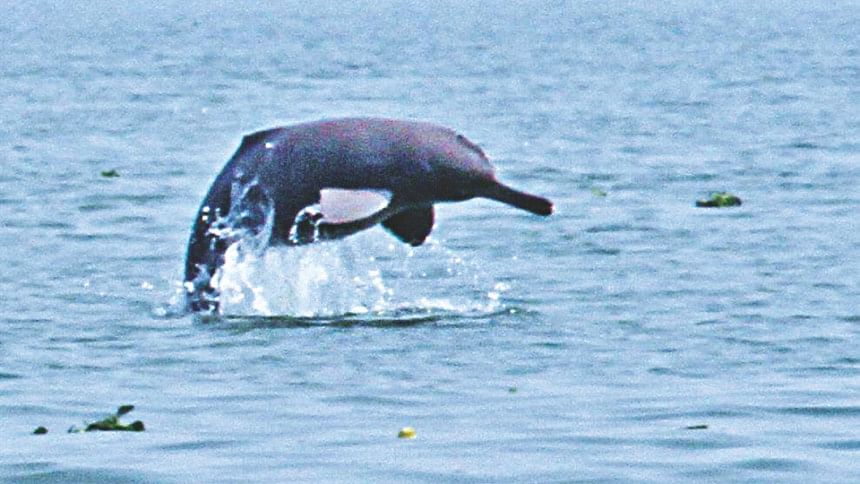Study finds ways to save Halda dolphins

Regular patrolling and reducing the number of self-powered vessels plying the Halda river could help recuperate the endangered dolphin population in the river, according to a study.
The river is possibly the lone breeding ground of natural carp in South Asia and the species was enlisted endangered by International Union of Conservation of Nature (IUCN) during a 2013-2016 survey.
In 2018 alone, 18 dolphins were found dead in the Halda, raising concerns on the declining population of the mammal, locally known as a ‘Shushuk’.
However, a study conducted by the forest department, in cooperation with United Nation Development Project and Global Environment Facility, found that it is possible to recuperate the dolphin population.
The four-month study that concluded in February was led by M Monirul H Khan, eminent wildlife biologist and professor of zoology department of Jahangirnagar University. It was done as a part of the ‘Expanding Protected Area System to Incorporate Aquatic Ecosystem Project’.
According to the findings, there are an estimated 45 dolphins along the 20km stretch of Halda river, ranging from Modunghat to Sattar Ghat, a hotspot for these mammals.
The major threats that were identified include illegal fishing gillnets where dolphins get entangled, a high level of pollution from nearby industries, mechanised boats that ply through the river and diversion or withdrawal of fresh water.
Eighty four percent of the dolphin population are adults, while the rest are juvenile, the study added. However, researchers did not encounter any young dolphin during the study period.
The research team also assumes that the Karnaphuli river contains a good number of these mammals.
A similar study conducted 20 years ago in Sangu and Karnaphuli River found at least 125 dolphins.
The species, Platanista Gangetica, could be conserved in the long run, the lead biologist told The Daily Star.
“But for that to happen, we have to plan not only for Halda but also Karnaphuli River, as the mammal frequently enters Halda from there.”
Halda gets more attention, but the Karnaphuli cannot be ignored as the two water bodies form a unique habitation for these river dolphins, he added.
Monirul recommended that the Halda be declared a sanctuary and initiate smart patrolling at Halda by a team of officials from the wildlife conservation unit and department of fisheries.
Furthermore, he advised the control of mechanised boats plying the waters, reduce local communities’ dependence on the Halda by ensuring alternative income generation, and develop eco-tourism.
The study underscored the need to form a conservation wing at the Forest Department and Department of Fisheries to protect the species.
Top officials of Forest Department did not want to comment on the study.
Preferring anonymity, top brass of the department with knowledge of the study told The Daily Star that UNDP is yet to submit the study to them.
They will take steps as per the study’s recommendation, the high official added.
Raqibul Amin, country director of IUCN Bangladesh, said the research findings is good news for wildlife conservationists.
“We hope the government will come up with a practical strategy to save the dolphins in Halda and Karnaphuli.”

 For all latest news, follow The Daily Star's Google News channel.
For all latest news, follow The Daily Star's Google News channel. 








Comments